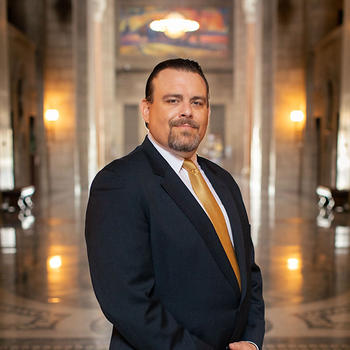First of a series
Federal workers who have lost their jobs and graduating government students would do well to consider state and local government positions. That’s the assessment of John P. Stinner, a 2009 graduate of George Mason University's master of public policy program.

Stinner is now the borough manager of Dormont, a municipality of some 8,000 residents bordering Pittsburgh, Pennsylvania.
For Stinner, 46, working in local government wasn’t part of the plan. With a master’s degree from Schar School of Policy and Government and considerable, career-oriented experience on Capitol Hill and in international development, the registered Independent imagined his career unfolding in Washington, D.C., or abroad.
But when life led him to Pittsburgh, he discovered something surprising: the immense opportunity and fulfillment of working at the local level.
“I thought it wasn’t sexy. I thought it wasn’t interesting,” Stinner said. “I came to find out that it’s an incredibly engaging job.”
Now Stinner, the borough manager, is a passionate advocate for careers in local government. He believes that many professionals and students of government overlook these positions despite their impact, stability, and competitive compensation.
“There’s a huge need right now in my industry,” said Stinner, who became Dormont’s manager six months ago. “Public service just doesn’t get the same [application] numbers it used to.”
Local government jobs offer attractive salaries, pensions, and excellent benefits, he said. “It’s a six-figure job with great benefits. I have better health insurance than anyone I’ve ever met.”
Stinner’s journey into local government began unexpectedly. After moving to Pittsburgh due to his wife’s career, he found himself exploring new opportunities. A connection at a University of Pittsburgh think tank led him to work in municipal management, and the rest is history.
“If you had asked me as an undergrad [at the University of Wyoming] if I’d be working in local government, I would have told you you’re crazy,” he said.
But as it happened, the skills he developed in international development translated seamlessly into his work with local communities. From economic development to budgeting, transportation to collective bargaining, his leadership role touches a variety of critical issues.
Stinner recalled that a classmate from George Mason landed a position in nuclear nonproliferation policy in Washington, “really big, high-level stuff,” he said. Impressive, yes, but a mentor put things in perspective when he asked, “How many times do you think your friend will actually affect public policy in their career? We affect public policy every day.”
“And I see that as a very rewarding part of my job,” Stinner said. “If you’re really looking to make a difference, you can make a difference every day in local government.”
As for compensation, Pennsylvania Governor Josh Shapiro (D) recently signed an executive order making the local officials’ pay equivalent to that of positions in the state government. He also signed an order to bring fired federal workers to Pennsylvania to fill some 5,600 openings in state and local roles.
Additionally, he said, “There’s a ‘gray tsunami’ of all the Baby Boomer retirees, and early Gen Xers are starting to retire as well. We just don’t have the ranks coming in behind to fill those jobs.
“Engage with local government. See what’s available,” he said. “There’s so much work to be done.”
The Schar School is working to assist those considering careers in government, nonprofit, and government-adjacent organizations by offering application fee waivers, discount pricing, flexible and customizable courses, and other programs. Find out more about “upskill” and retooling certificate and degree programs here.
